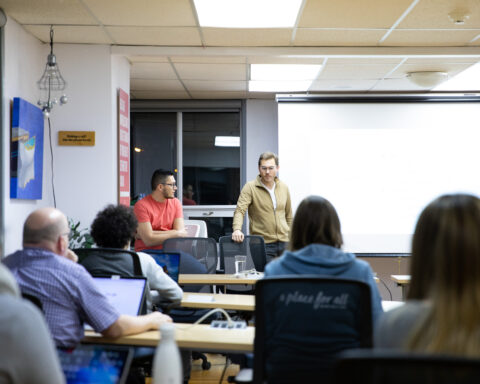In Tell Everyone: How the Stories We Share Shape What We Know and Why It Matters, author Alfred Hermida explores how social media has the potential to be revolutionary in all aspects of our lives, “if we take the trouble to discover why people share and with whom.” Hermida explores the underlying emotions of sharing. Those who wish to reach us and want us to share what they offer must connect with us on an emotional level.
It’s not a how-to book. But it is a wide-ranging book about what to be aware of, as social media becomes an increasingly important tool in our work or life. It will be of interest to you if you’re wondering how social media specifically impacts entertainment, activism, politics, international crises, marketing or business.
The book is meticulously researched, with extensive notes at the back of the book for further perusal, if you’re so inclined. But are you?
Ultimately, this book is about literacy; it’s about the need to develop our critical thinking skills to properly assess the information we get from social media. It’s something we all need to become better at, whether assessing a rumour someone shares on Twitter, or figuring out how to deal with information flowing out of a massive natural disaster.
Tell Everyone is an easy read. A comfortable read, much like diving into someone’s blog. Hermida mixes well-known anecdotes about social media fails and successes with stories I had no idea about.
You’ve heard about the amplifying use of social media during “Arab Spring,” you see the tweets in mainstream media stories about natural disasters and corporate communication blunders. But did you know that citizens in drug-infested towns in Mexico tweet about cartel violence locations to help neighbours plan their day more safely? Mind blowing.
The book is meticulously researched, with extensive notes at the back of the book for further perusal, if you’re so inclined. But are you?
Hermida acknowledges that “(t)here are consequences when our social circles become our editorial filters.” Facebook research itself confirms a growing echo chamber on its own service, where everyone around us reinforces our own views and we don’t seek, see or hear opposing views.
One of the issues we all face with incessant information overload and over-sharing is that we read, scratch the surface, but don’t dive into the notes, the sources, the evidence. And, if you share to the extent Hermida shows many of us do, you’re probably not doing it nearly critically enough.
That’s an increasingly large problem, which needs some attention.
A ‘Renaissance in Sharing’ . . . Is ‘Ours to Use’
Hermida outlines his concern for the “gulf between our view of social media and our understanding of it.” For him, it is “not a story about technology . . . [rather] our human urge to share.”
At the same time, it is always about the technology. Now more than ever before, we can publish with few technological barriers, to the point where “mainstream and social media intertwine to influence what makes the news and how the news is presented.” Your voice may become the voice I listen to and trust, at the expense of trained journalists and editors.
Hermida acknowledges that “[t]here are consequences when our social circles become our editorial filters.” Facebook research itself confirms a growing echo chamber on its own service, where everyone around us reinforces our own views and we don’t seek, see or hear opposing views. It’s a problem, particularly with increasing numbers of people who wait for the news to find them, instead of seeking it out.
As with many issues, this isn’t an Internet problem, it’s a human problem. Many of us have become “accidental news consumers.” We log onto Facebook to find cat videos, writes Hermida, but “stumble across news items by accident.”
In a shifting media era when “all the news that’s fit to share” becomes the priority, alarm bells go off. If media only chase what’s popular, we risk our independent, investigative and informative journalism. Hermida doesn’t delve deeply enough into the primacy of the popular and how this can impact our news literacy or democracy; he merely states that it is part of our new reality.
Hermida is certainly not utopian in his approach. He explores both the downside and potential of social media in our lives. And he offers a well-balanced view of both possibilities, ranging from devastating social shaming to what brings down corrupt government leaders.
It’s not enough. Living in an echo chamber isn’t new, it’s part of being human, Hermida argues. But, as Facebook and other filtering technologies contribute to the already human tendency we have to surround ourselves with people like us, who think like us, and like what we like, how can we get beyond the echo chamber?
It is, as Hermida writes, essential for us to commit to “going beyond similar people and connecting with those with different backgrounds or views.”
We could all spend more time learning about our own habits and biases and seek diversity of voices in our lives. Yes. But, while independent journalism is popping up more than ever before (see this website, the Tyee, Ricochet, rabble, Rebel TV and others), in many cases this can only serve to deepen the echo chamber.
As with many issues, this isn’t an Internet problem, it’s a human problem. Many of us have become “accidental news consumers.” We log onto Facebook to find cat videos, writes Hermida, but “stumble across news items by accident.”
There’s more Hermida could delve into here. Hermida tells us that the information flow is ours to use. How do we, as individuals, practically take on that task as we’re bombarded with overwhelming information, opinions, rumours and news?
As our friends and connections “are taking on the job of editors, filtering and selecting what is important, interesting or diverting” for us, it’s ever more important that we find ways to identify trusted and diverse sources.
Hermida is optimistic about research that shows how weak online ties and casual social media acquaintances expose us to more diversity of thought. But how many of us actually click, read or even skim that diversity?
Few of us actively look for diverse or opposing views to our own. I don’t share his optimism that merely being exposed to diverse perspectives in the fire hose of our newsfeeds leads to greater mutual understanding.
Your Homework
Hermida recommends we use social media with purpose. He refers to “situational awareness,” essentially creating a personal social media strategy: be aware of what is happening around you, make sense of what we see/hear, use that understanding to make better decisions (i.e. share better), backed up with data and evidence.
When we share, share well. When we consume, consume more critically. It makes sense to have a strategy to be better communicators and curators. This book won’t give you the how – just the strong suggestion that you should.
It’s a start. But there’s more Hermida could delve into here. Hermida tells us that the information flow is ours to use. How do we, as individuals, practically take on that task as we’re bombarded with overwhelming information, opinions, rumours and news?
Spend some time with Howard Rheingold’s approach to “CRAP detection.” Like Hermida, Rheingold looks at how an old skill, critical thinking, can be applied in a new medium. It’s a skill we all need to develop.
Marco Campana does freelance communications work with organizations that serve immigrants, refugees and promote diversity. He provides social media support, writing, editing and internal website consultation and strategy. In particular, he helps settlement agencies harness and implement social media and technology in their community service work.





